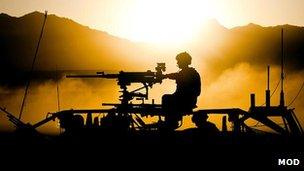Defence cuts: Army battalions could be axed or merged
- Published

Around 20,000 soldiers are due to be cut from the Army by 2020
Entire British Army infantry and armoured units could be abolished or merged to save money, the Defence Secretary Philip Hammond has warned.
<link> <caption>In an interview with The Daily Telegraph</caption> <url href="http://www.telegraph.co.uk/news/uknews/defence/9250905/Regiments-with-Commonwealth-recruits-face-being-wiped-out.html" platform="highweb"/> </link> , he indicated that those who recruited from abroad could be more vulnerable.
Currently about one in 10 Army soldiers come from outside the UK.
The Ministry of Defence (MoD) says no decisions have yet been made, and no particular units have been singled out.
The Army is set to be reduced from 102,000 soldiers to 82,000 by 2020, under plans set out in the Strategic Defence Review.
Other cost-cutting measures include cuts of about 35% to heavy artillery, and a 40% reduction in the numbers of Challenger 2 tanks.
Foreign recruits
Mr Hammond told the Telegraph the Army must reduce in size.
"Clearly the Army cannot get smaller by 17% without losing some units," he said.
"I cannot say to you that there will be no loss of battalions in the infantry as we downsize the Army. We are looking at the options in the Army and the armoured corps."
The defence secretary added that some Army units no longer had a significant link with their traditional homes.
"It is not the case that all Army units, as they once did, have strong geographical recruitment ties.
"We have units that are significantly under-recruiting. We have units that are recruiting a significant part of their strength from foreign and Commonwealth countries."
An MoD spokesman told the BBC that no single regiment was being "singled out", and regiments in Scotland were not at greater risk despite reported difficulties in recruiting from among the local population.
Such regiments include the Black Watch, Green Howards and Argyll & Sutherland Highlanders.
Largest intake
Shadow defence secretary Jim Murphy said: "The defence community will be dismayed that history is being dismissed.
"Defence is about more than inputs, outputs and spreadsheets. It is also about people, tradition and pride.
"The country will want confidence the defence secretary is doing all possible to preserve important historic legacies."
He said: "The Army is currently 'top heavy', and the government must go further than planned to cut the numbers of senior officers to tackle imbalance.
"Savings have to be made and Army restructuring is required, but ministers must do so in a way that makes our forces more efficient while respecting long-standing ties."
Latest defence figures show that about 10,200 people were recruited to the Army last year, with more than 9,000 from the UK.
The largest intake of troops from abroad were from African nations such as Ghana (123 soldiers), the Gambia (54) and South Africa (55).
Last week, Fijian recruit Pte Ratu Manasa Silibaravi was killed during a mortar attack in the Nahr-e-Saraj district in Afghanistan's Helmand province.
An Army spokesman said: "Commonwealth personnel have a long history of distinguished service in the British Army as exemplified by [Grenada-born Iraq war hero] L/Cpl Johnson Beharry VC.
"The contribution of Commonwealth personnel to the defence of the United Kingdom is significant both past and present and is greatly valued. Commonwealth personnel bring an additional diversity to the Army."
- Published9 February 2012
- Published25 January 2012
- Published17 January 2012